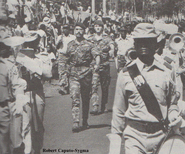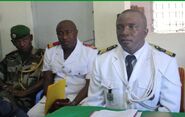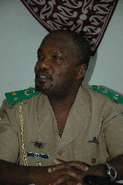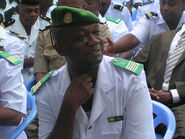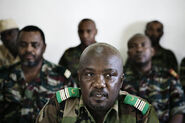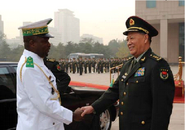Вооружённые силы Комор — государственная военная организация Союза Коморских островов. Включает в себя небольшую регулярную армию и полицию в размере 500 человек, а также 500 членов сил обороны.
История[]
The Comoro Islands, consisting of four main islands and a number of smaller ones with a total area of 2236 km^ and a population of about 300,000, occupy a potentially important strategic position at the northern end of the Mozambique Channel (between the Malagasy Republic and the east African coast) through which passes 90% of the Arab and Iranian oil destined for Europe. The islands are virtually without visible means of support, and the average annual per capita income of about $50 makes them a leading contender for the title of poorest country in the world. There is, however, a large armed force, devoted entirely to internal security duties, which has been variously reported at strengths of up to 11, 000 men. The four main islands of Grande Comore, Anjouan, Mayotte and Moheli are ethnically very mixed, having been subjected to successive waves of settlement from the Malagasy Republic, Indonesia, Arab countries, Africa and Iran, with further variety being added subsequently by Portuguese and French colonisers and their imported Indian and Chinese plantation workers. On all of the islands the dominant language is a kind of Malagasy patois with degrees of Arabic and Swahili influence that vary from one island to another. Culturally all of the islands except Mayotte have been most strongly influenced by Arab culture and have adopted the Muslim faith. The traditional ruling elite was an amalgamation of the original Arab conquerors (no longer racially distinct) and the Shirazis, of Iranian origin, who arrived via Zanzibar in the seventeenth century. Although an Arab— Shirazi sultanate also ruled on Mayotte, that island has retained a strongly Indian and Malagasy character, and the inhabitants became for the most part adherents of the Roman Catholic church over the course of the last three centuries. This deep division between Mayotte (population about 40,000) and the other islands was the principal stumbling block in the way of a smooth progression to independence from France, since the inhabitants of Mayotte, with bitter memories of Arab — Shirazi rule, had no intention of being submerged in an Islamic Comoran State run from Moroni on Grande Comore. It is also clear, however, that France was extremely reluctant to surrender Mayotte, the only island whose deep water harbour potential makes it a possible strategic base. Paris therefore consented to the demand by the inhabitants of Mayotte that the referendum on independence in 1974 be held separately on each island. The three Muslim islands voted almost unanimously for independence, but the population of Mayotte voted 65% against independence. In an attempt to forestall the expected separation of Mayotte from the other islands, the Comoran Chamber of Deputies voted for an immediate unilateral declaration of independence on July 6th, 1975 and elected Ahmad Abdallah, the President of the Executive Council since 1972, as President of the new State. This declaration of independence, however, had no practical effect on Mayotte, which remained under the control of France. Less than a month later, on August 3rd, 1975 President Ahmad Abdallah was ousted by a coup mounted by the principal opposition parties, making use of mercenary forces provided by Colonel Bob Denard, a well-known French Basque soldier-of-fortune who had been providing mercenary services in a large number of African countries ever since the Congo troubles of the early 1960s. The Comoran leader of this coup was Ali Soilih, who was formally appointed President by the Revolutionary Council on January 2nd, 1976. At the same time France extended formal recognition to the Comoro Islands, but when President Soilih attempted to mount an unarmed landing on Mayotte and followed that by nationalising all French assets on the islands, Paris replied by withdrawing all its personnel including its indispensable teachers and doctors. At this point the Comoros faced economic disaster, with only 675 tons of rice remaining to take the islanders through 6months to the next harvest. International emergency aid succeeded in staving off a famine, but the chaotic and brutal rule of President SoiUh during the next 34 months reduced the islands to a truly terrible state. Proclaiming a 'cultural revolution', he dismissed the entire civil service of 3500, replacing them mainly with semi-literate high-school students, and ordered the burning of every file in the government records. The voting age was lowered to fourteen, and even telephones and typewriters were systematically smashed in the regime's revolutionary zeal. Traditional Comoro customs such as elaborate marriage ceremonies were banned, and a complete break with the past was proclaimed. A formal political system of 'direct democracy' on the Libyan model was proclaimed, but actual enforcement of the dictator's decrees was placed in the hands of a 'people's army' or presidential militia comprised mainly of tough young men between the ages of sixteen and twenty. The stated purpose of the army was 'revolutionary construction', plus a vague future commitment to 'the reconquest of Mayotte', but its main activities were extortion and terrorism on behalf of the regime. Entire villages suspected of disloyalty were frequently razed and their inhabitants tortured and murdered. Large numbers of refugees fled to Mayotte. Further troubles heaped on the Comoros included anti-Comoran riots in the Malagasy Republic which forced the mass repatriation of the 60,000 Comoran immigrants in the Majunga region to already severely overpopulated Grande Comore and Anjouan, and an abortive rising on the latter island in June, 1976 which was savagely suppressed. A certain tenuous contact was maintained with Tanzania, whose interest in keeping Indian Ocean islands out of the hands of the great powers caused it to lend President Soilih a few Tanzanian military advisers, but a Comoran application to join the Arab League in 1977 was met with little enthusiasm. The regime's other main external contacts were with Libya and China (which 146 Comoro Islands maintained the only foreign diplomatic mission in the country) , and despite considerable foreign aid from Arab sources the economy had almost totally disintegrated by early 1978. Almost all the foreign development aid that was received was diverted to buying military equipment and paying foreign advisers (i.e. mercenaries). Food production had declined drastically, disease was rife and infant mortality was soaring. At this point reappeared Colonel Bob Denard, this time in league with former president Ahmad Abdallah whom he had overthrown on Ali Soilih's behalf less than 3years before. On the night of May 13th, 1978 Denard led 50 mercenaries, armed only with sawn-off shotguns and hand grenades, ashore from a French-registered trawler anchored off Moroni, and seized control of the government . Resistance was minimal — only three presidential guards were killed , and one mercenary was wounded in the arm — and in 2hours Ali Soilih was a prisoner. After taking part in a re-enactment of the invasion for the benefit of a French television team which fortuitously arrived in the islands, AH Soilih was shot and killed 'while trying to escape' 2 days later. The new government was announced as a 'political— military directorate' consisting of two Co-Presidents, Ahmad Abdallah and his colleague Muhammad Ahmad, and Colonel Denard as Defence Minister, Commander-in-Chief of the Armed Forces and Chief of PoHce. Denard assumed Comoran citizenship, embraced Islam, and took the new name of Said Mustapha Mohadjou in order better to fit his new role of 'participating in national reconstruction and forming a viable army and police force of quahty'. This did not suffice to calm the indignation of other African nations, most of which are understandably terrified by the idea of white mercenary involvement in African domestic politics, and there was talk of a boycott of the Comoros by the Organisation of African Unity. Accordingly, Colonel Denard agreed to resign his posts and leave the country on September 27th, 1978. A few days later a referendum on a new constitution was held which yielded a 99.31% affirmative vote, and Co-President Muhammed Ahmad resigned in order to clear the way for Ahmad Abdallah to assume the presidency. The new constitution is of the federal type, leaving the way clear for the accession of Mayotte at some future date, but this does not seem likely any time soon. A referendum held on February 8th, 1976 resulted in a 99.4% vote for retaining that island's hnks with France, and in a further referendum on May 11th of that year Mayotte voted against remaining an Overseas Territory (TOM) of France, preferring the closer connection involved in becoming an Overseas Department (DOM). Paris promised to implement the electorate's wishes, although the United Nations recognises the government in Moroni as sole representative of the whole island group. The future composition of the Comoros army is unclear, but it is certain that the regime will continue to need such a force for internal security purposes. It is very probable that much of its strength will continue to consist of the youthful members of the former 'people's army', if only because they are too dangerous to be left wandering around outside it, and that numbers of Denard's mercenaries will be retained in some more tactful capacity in an effort to train and discipline the force. The future of the strategic island of Mayotte seems for the moment to be securely tied to France, and the island is gradually developing into a major French base in the southern Indian Ocean, with several thousand French military personnel in residence or in transit at most times.
Униформа[]
Униформа ВС Комор, в целом, следует французском образцу.
Галерея[]
Источники[]
- https://en.wikipedia.org/wiki/Military_of_the_Comoros
- https://fr.wikipedia.org/wiki/Armée_nationale_de_développement
- http://www.sammler.ru/index.php?showtopic=101828&page=5
- John Keegan. World Armies. — P.146.
| Северная Африка: | Алжир • Египет • Ливия • Марокко • Тунис |
| Центральная Африка: | Ангола • Габон • Камерун • ДР Конго • Конго (Браззавиль) • Сан-Томе и Принсипи • ЦАР • Чад • Экваториальная Гвинея |
| Западная Африка: | Бенин • Буркина-Фасо • Гамбия • Гана • Гвинея • Гвинея-Бисау • Кабо-Верде • Кот-д’Ивуар • Либерия • Мавритания • Мали • Нигер • Нигерия • Сенегал • Сьерра-Леоне • Того |
| Восточная Африка: | Бурунди • Джибути • Замбии • Зимбабве • Кения • Руанда • Сомали • Танзания • Уганда • Эритрея • Эфипия • Южный Судан |
| Южная Африка: | Ботсвана • Коморы • Лесото • Маврикий • Мадагаскар • Малави • Мозамбик • Намибия • Свазиленд • ЮАР |


